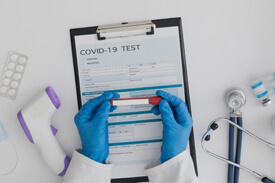 14 Dec, 2020
14 Dec, 2020
There are several tests available for diagnosis of SARS-Cov2 virus. These tests mainly detect either nucleic acid,protein parts of virus and antibody against the virus. The qRT-PCR which detects nucleic acid (RNA) is the gold standard however it is costly, requires specialized equipment, health personnel training as well as has a longer turnaround time.
The CRISPR-Cas system is an adaptive immunity mechanism used by some prokaryotes . The genetic altering process which consists of a cleavage enzyme and a guide RNA can be utilized for developing diagnostics and therapeutics and has also been used in food industry.
This new test,”Tata MD check” detects nucleotide of the SARS-Cov2 virus by using CRISPR-Cas9(Clustered Regularly Interspaced Short Palindromic Repeats)gene editing technology. It has a sensitivity of 96% and specificity of 98% and costs around INR 500 with a turnaround time of approximately 45 minutes.This is a paper strip kit which is quite easy to interpret and is based on lateral flow technique called Feluda(FNCAS9 Editor-Limited Uniform Detection Assay) developed by CSIR-Institute of Genomics and Integrative Biology (CSIR- IGIB),India. The Tata Medical and Diagnostics in collaboration with Apollo hospitals, India have developed this rapid, cheap and efficacious diagnostic test. It is the first in the world to use Cas9 , prior to this diagnostic tests have been developed based on SHERLOCK( specific high-sensitivity enzymatic reporter unlocking),DETECTR and Cas12,Cas13. Interestingly Feluda is a fictional Indian detective from novels written by renowned writer Satyajit Ray.The Indian Council of Medical Research and Drugs Controller General of India have approved this test. The sample required is a nasopharyngeal or throat swab or lung fluid.
. Recently a team of scientists Fozouni P et al in U.S have also reported about another test for detection of SARS-CoV2 based on CRISPR-Cas13a which is linked to smart phone ( Cell, available online ,ahead of print). The scientific community around the world is working tirelessly to find newer tests, vaccines, therapeutics to fight this deadly virus.
References:
1. Jolany vangah, S., Katalani, C., Boone, H.A. et al. CRISPR-Based Diagnosis of Infectious and Noninfectious Diseases. Biol Proced Online 22, 22 (2020). https://doi.org/10.1186/s12575-020-00135-3
2. Parinaz Fozouni, Sungmin Son, María Díaz de León Derby, Gavin J. Knott, Carley N. Gray, Michael V. D’Ambrosio, Chunyu Zhao, Neil A. Switz, G. Renuka Kumar, Stephanie I. Stephens, Daniela Boehm, Chia-Lin Tsou, Jeffrey Shu, Abdul Bhuiya, Max Armstrong, Andrew R. Harris, Pei-Yi Chen, Jeannette M. Osterloh, Anke Meyer-Franke, Bastian Joehnk, Keith Walcott, Anita Sil, Charles Langelier, Katherine S. Pollard, Emily D. Crawford, Andreas S. Puschnik, Maira Phelps, Amy Kistler, Joseph L. DeRisi, Jennifer A. Doudna, Daniel A. Fletcher, Melanie Ott. Amplification-free detection of SARS-CoV-2 with CRISPR-Cas13a and mobile phone microscopy. Cell, 2020; DOI: 10.1016/j.cell.2020.12.001
3. www.tata.com
4. www.crisprtx.com
|